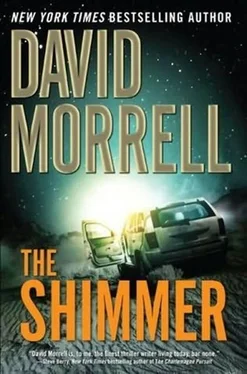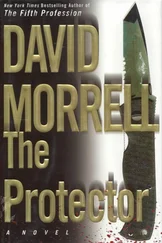“We.”
“What?”
“We can win an Emmy.”
“Right.” Brent aimed the camera at her, emphasizing the blood that soaked her safari-type jacket. He got a close-up of the tourniquet he’d made for her arm.
The helicopter, he realized. Need to get video of the helicopter while it’s still burning.
He squirmed along the furrow until he guessed he was far enough that the guard wouldn’t look in that direction. Easing up, he saw the smoke and flames rising from the chopper’s wreckage. He aimed the camera’s lens and zoomed it toward the part of the fuselage that had crushed a section of the fences.
Yeah, he thought, I’ll get an Emmy for this.
He corrected himself. The two of us will get Emmies.
If we live.
Sergeant Lockhart drove the motorcycle past the TRESPASSERS WILL BE PROSECUTED sign and stopped at the gate to the observatory. To the west, he heard a faraway helicopter. The lowering sun angled toward his eyes and made it difficult for him to distinguish the enlarging speck of the chopper. Presumably it was the Black Hawk that Colonel Raleigh had told him would be delivering more equipment.
So far no problem. Everything was on schedule.
Plus, Lockhart had gotten the chance to enjoy a motorcycle ride. The truth was, any opportunity to get away from the colonel was enjoyable. The guy had threatened to send him to a war zone, and Lockhart had begun to wonder if maybe that would be preferable to his current assignment. Just about any place would be better than that creepy facility under the abandoned airbase.
Shoot the dog? What the hell was that about?
The sergeant reached into a jeans pocket and pulled out the key the colonel had given him, preparing to free the lock on the gate. Then he noticed that the barrier felt unsteady. He glanced along it and saw that the opposite end wasn’t resting on its hinges.
Frowning, he pushed the gate open. As he guided the motorcycle toward the lane that led to the observatory, a noise made him pause, then crouch protectively. He’d heard the noise many times in Iraq.
The rumble of a distant explosion.
It came from the direction of the observatory.
Moments later, a second explosion followed. Lockhart searched the sky but no longer saw or heard the helicopter. What he saw in- stead was smoke rising.
A third explosion brought more smoke.
He reached back toward a canvas sack mounted on the rear of the motorcycle. The sack concealed his M4, along with two spare hundred- round magazines and a half-dozen boxes of ammunition-a troubling amount that the colonel had insisted on.
The sack also contained a scrambler-equipped two-way radio that Lockhart hastily withdrew.
Holding an earplug in one hand, Raleigh listened to the disturbing report that came through the two-way radio. His mouth was uncharacteristically dry.
“I can’t send reinforcements until dark,” he said into the radio. “The Suburbans are the only transportation we have. They’re so conspicuous, if I send men in the daytime, the crowd down the road is bound to see. We can’t compromise our security. Reconnoiter as close to the observatory as you can. Keep reporting back.”
Raleigh ended the transmission. When he reinserted his earplug, shut- ting out two-thirds of the sound in the room, he noted that some of the men in front of the monitoring equipment were glancing curiously in his direction. Even though it was after 6 in the evening, the cold overhead lights continued to make the time feel like 3 o’clock in the morning.
“Is everything adjusted?” His abrupt tone challenged one of the men, suggesting that there were more pressing things to do than eavesdrop on his radio communications.
“Just about, sir,” the man quickly answered. “We’re starting to amplify the signals.”
Raleigh stood behind the man. A computer screen showed random dots that provided a visual correspondence to the static coming from audio monitors on a table near other glowing electronic equipment. Shelves were filled with receivers, analyzers, and decoders. If all went as planned, soon the static would resolve itself into the alluring music he’d heard at Fort Meade, and then the computer screen before him would show the equivalent of gliding, floating, hypnotic lights.
“You’re not wearing your earplugs, soldier.”
“Sorry, sir. I’ve been so busy that I forgot.”
Raleigh moved to the center of the room and raised his voice.
“All of you, listen up!”
The eight men raised their heads from the electronics they were adjusting.
“Everybody wears earplugs.” Raleigh pointed toward his own. “I warned you that the audio component of this project can damage your hearing. I don’t want somebody’s mama crying to me because you didn’t listen to orders and went deaf. Put in the earplugs now!”
They hurriedly did so.
“If necessary, add the noise-reducing headphones we brought.”
When he was satisfied that everyone had obeyed, he walked to- ward a metal door that led to the facility’s innermost room. In truth, he wasn’t worried about his men going deaf. If this experiment went wrong, going deaf would be the least of their problems.
What he hoped was that the earplugs-and if necessary the noise- reducing earphones-would protect their hearing enough to keep them alive.
Once inside the central chamber, he watched a closed-circuit television monitor that showed a view of the abandoned airbase that sprawled above him. Beyond the collapsed, rusted aircraft hangars, he saw the German shepherd and its trainer patrolling the fence. The crowd had spread far enough from the viewing area that some people were talking to the dog’s trainer. The animal snapped at them. The people on the other side of the fence held up their hands in a we don’t want a problem gesture and backed away.
Raleigh wondered if the German shepherd was normally that aggressive.
We’ll soon find out. After dark, I’ll bring the dog back inside. We’ll see how it behaves. Its ears are more sensitive than ours. If there’s trouble, it’ll react before humans do-and before we need to shoot it.
He studied the room’s thick metal door, assuring himself that it could withstand a grenade blast. He verified that his M4 and several loaded one-hundred-round magazines were in a corner. He opened a filing cabinet and made sure that a trauma kit and emergency rations-including water-were inside in case he was forced to barricade himself in this room for a considerable length of time.
What else do I need to plan for? There’s always something.
He’d done his best to take everything into account. Nonetheless, he paused to consider the history of this place and search his memory for anything he might have missed. He knew by heart every event that had happened on this spot. He’d read all of the reports. They stretched back long before the military had established a presence here. One of the reports, however, had been passed down not from a historian or a tactician.
It had come from his great-grandmother.
January 22, 1916.
The horse became restless. It was normally so well-behaved that its rider-a twenty-nine-year-old schoolteacher named Dani Marie Brown-glanced warily around, assuming that coyotes were in the area.
She was riding on the dusty road that led from Rostov to Loden, a town fifteen miles away where she taught grade school on Thursdays, Fridays, and Saturdays after teaching on Mondays, Tuesdays, and Wednesdays in Rostov. Three days a week was the most that local cat- tlemen in each place would allow their children to be away from their ranching chores.
Dani sometimes was at school from dawn until dusk, preparing classes or grading tests when the children weren’t at their desks. It was a tiring schedule, but she’d been raised in Rostov, and she hadn’t liked being away from home while she’d earned her teacher’s certificate in noisy, crowded El Paso. Long, quiet hours in this familiar, re- assuring area were preferable to the chaos of the unknown, outside world.
Читать дальше












